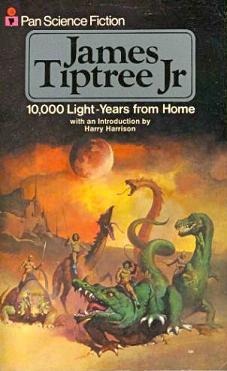
10,000 Light-Years from Home
James Tiptree, Jr.
255 pages
published in 1973
Ther may have been something ineluctably masculine about James Tiptree Jr’s writing, as Robert Silverberg will never live down writing in his appreciation of Tiptree, but he’s still part of my Year of Reading Women project. Because as we all know now, but Silverberg didn’t, “James Tiptree Jr” was a pseudonym for Alice B. Sheldon. Sheldon’s reasons for chosing a male pseudonym were many and complex and if you want to know all about it, read Julie Phillips James Tiptree, Jr.: The Double Life of Alice B. Sheldon. Suffice to say that at the time of 10,000 Light-Years from Home, Tiptree’s first collection, the secret was not out yet, as is obvious from Harry Harrison’s introduction, full of what “he” did during the war. All of which was true by the way, just with the genders flipped.
James Tiptree, Jr. therefore was an obvious entry for my little project; the reason I chose this particular collection was just because this was the only one at hand. I’ve read quite a lot of Tiptree stories, as well as several under her other pseudonym, Raccoona Sheldon, but mostly through various anthologies rather than her own collections. Because 10,000 Light-Years from Home is such an early collection it misses most of Tiptree’s best stories. Worse, some of her better known early stories, like e.g. “The Last Flight of Dr. Ain” or “Your Haploid Heart” are also missing. Yet what remains is still a very good collection of short stories any writer could be proud of. What struck me is that some of the stories in this collection could’ve been published in Analog unaltered, which is not what you’d expect from Tiptree’s reputation as a “difficult”, too feminist, New Wave writer who helped ruined science fiction, as some of the troglodytes online would have it.
Sam Dodsworth
October 5, 2011 at 4:12 amI think both “The Man Who Walked Home” and “Beam Us Home” are best read as critiques of SF triumphalism. In “The Man Who Walked Home” it’s the pure focused will of the explorer that’s bringing him back – but with nothing left of what he found and a global disaster when he returns. In “Beam Us Home”, the protagonist’s obsession with SF keeps him from doing anything that might have helped stop the world from going to hell.
Martin Wisse
October 5, 2011 at 6:29 amThose do work quite well that way, yes, now you’ve mentioned it, especially “Beam Us Home”.
Sam Dodsworth
October 6, 2011 at 4:21 amAlso… I don’t personally think the boy in “Beam Us Home” does turn out to be right – I think the way he reacts is just a sign of his alienation.
In general, most of Tiptree’s work is critical of romanticism – either the boy’s club romanticism of SF or of romance in gender relations. See “Love is the Plan, the Plan is Death” for probably the bleakest expression of that last.